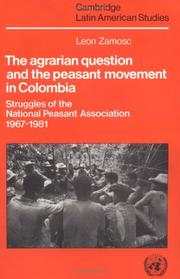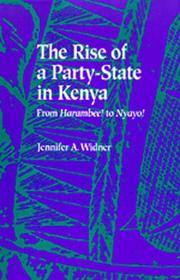| Listing 1 - 8 of 8 |
Sort by
|
Book
ISBN: 0853455996 0571110665 0571118879 Year: 1981 Publisher: London Faber and Faber.
Abstract | Keywords | Export | Availability | Bookmark
 Loading...
Loading...Choose an application
- Reference Manager
- EndNote
- RefWorks (Direct export to RefWorks)
Book
ISBN: 0691000123 9781400867356 1400867355 9780691621333 0691621330 9780691000121 0691030634 9780691030630 0691647992 Year: 2015 Publisher: Princeton, NJ : Princeton University Press,
Abstract | Keywords | Export | Availability | Bookmark
 Loading...
Loading...Choose an application
- Reference Manager
- EndNote
- RefWorks (Direct export to RefWorks)
In this 1970 expanded edition, which includes a new Preface and Introduction and a long new chapter, Professor Bienen discusses the events and significance of the Arusha Declaration in the light of his continued research since 1967 while a Visiting Lecturer at University College, Nairobi.Originally published in 1967.The Princeton Legacy Library uses the latest print-on-demand technology to again make available previously out-of-print books from the distinguished backlist of Princeton University Press. These editions preserve the original texts of these important books while presenting them in durable paperback and hardcover editions. The goal of the Princeton Legacy Library is to vastly increase access to the rich scholarly heritage found in the thousands of books published by Princeton University Press since its founding in 1905.
#SBIB:328H41 --- 329 --- 329 Politieke partijen. Partijwezen. Partijrecht --- Politieke partijen. Partijwezen. Partijrecht --- Instellingen en beleid: Afrika: comparatief / diverse landen --- TANU (Organization) --- Afrikanskiĭ nat︠s︡ionalʹnyĭ soi︠u︡z Tanganʹiki --- Nat︠s︡ionalʹnyĭ soi︠u︡z afrikant︠s︡ev Tanganʹiki --- T.A.N.U. --- Tanganyika African National Union --- Chama cha Mapinduzi --- POLITICAL SCIENCE / General.
Book
ISBN: 1921934174 1921934182 9781921934186 Year: 2014 Publisher: Canberra, Australian Capital Territory : ANU Press,
Abstract | Keywords | Export | Availability | Bookmark
 Loading...
Loading...Choose an application
- Reference Manager
- EndNote
- RefWorks (Direct export to RefWorks)
The Coombs Building at The Australian National University is a Canberra icon. Named after one of Australia’s greatest administrators and public intellectuals—‘Nugget’ Herbert Cole Coombs—for more than forty years the building has housed two of the University’s four foundational Schools: the Research School of Pacific and Asian Studies and the Research School of Social Sciences. This volume of recollections is about the former. It looks at life in the building through the prism of personal experience and happenstance. Part memoir, part biography, and part celebration, this book is about the people of Coombs, past and present. Through evocative and lucid reflections, present and former denizens of the building share their passions and predilections, quietly savour their accomplishments and recall the failings and foibles of the past with a kindly tolerance.
Educational Institutions --- Education --- Social Sciences --- Australian National University --- History --- Alumni and alumnae. --- Australian National University, Canberra. --- Australia. --- A.N.U. --- Ao-chou kuo li ta hsüeh --- ANU (Australian National University) --- Universiṭah ha-leʼumit ha-Osṭralit --- האוניברסיטה הלאומית האוסטראלית --- Universities and colleges --- History. --- Coombs Building (Canberra, A.C.T.) --- Anecdotes. --- Colleges --- Degree-granting institutions --- Higher education institutions --- Higher education providers --- Institutions of higher education --- Postsecondary institutions --- Public institutions --- Schools --- Education, Higher --- Universities and colleges.

ISBN: 0521320100 0521031389 0511558945 0511870809 Year: 1986 Volume: vol 58 Publisher: Cambridge : Cambridge University Press,
Abstract | Keywords | Export | Availability | Bookmark
 Loading...
Loading...Choose an application
- Reference Manager
- EndNote
- RefWorks (Direct export to RefWorks)
In this book, Leon Zamosc provides an account of the history of ANUC and its struggle on three main fronts: for land, for the defence of the colonists, and for the protection of smallholders. The main focus of the book is on the land struggles. Professor Zamosc adopts a structural perspective, examining the agrarian contradictions that propelled the peasant struggles, the changing relationship between the peasant movement and the state, and the political and ideological content of the peasant challenge. He explores these issues in the light of the shifting patterns of class alignments and antagonisms that marked the rise and decline of peasant radicalism during the 1970s, and offers some suggestions about the significance of ANUC's struggles for the understanding of peasant movements in general.
Peasant uprisings --- -Peasantry --- -Land tenure --- -Agrarian tenure --- Feudal tenure --- Freehold --- Land ownership --- Land question --- Landownership --- Tenure of land --- Land use, Rural --- Real property --- Land, Nationalization of --- Landowners --- Serfdom --- Peasantry --- Agricultural laborers --- Rural population --- Marks (Medieval land tenure) --- Villeinage --- Peasants' uprisings --- Uprisings, Peasant --- Insurgency --- Revolutions --- Political activity --- Asociacion Nacional de Usuarios Campesinos (Colombia) --- ANUC --- A.N.U.C. --- National Peasant Association (Colombia) --- National Association of Peasant Users (Colombia) --- Land tenure --- Peasants --- -Political activity --- Agrarian tenure --- Asociación Nacional de Usuarios Campesinos (Colombia) --- Social Sciences --- Political Science

ISBN: 0521392543 0521070678 0511895860 Year: 1992 Publisher: Cambridge : Cambridge University Press,
Abstract | Keywords | Export | Availability | Bookmark
 Loading...
Loading...Choose an application
- Reference Manager
- EndNote
- RefWorks (Direct export to RefWorks)
Studies of revolution generally regard peasant popular support as a prerequisite for success. In this study of political mobilization and organization in Zimbabwe's recent rural-based war of independence, Norma Kriger is interested in the extent to which ZANU guerrillas were able to mobilize peasant support, the reasons why peasants participated, and in the links between the post-war outcomes for peasants and the mobilization process. Hers is an unusual study of revolution in that she interviews peasants and other participants about their experiences, and she is able to produce fresh insights into village politics during a revolution. In particular, Zimbabwean peasant accounts direct our attention to the ZANU guerrillas' ultimate political victory despite the lack of peasant popular support, and to the importance that peasants attached to gender, generational and other struggles with one another. Her findings raise questions about theories of revolution.
Polemology --- Internal politics --- Colonisation. Decolonisation --- Mozambique --- Guerrillas --- Peasants --- Public opinion --- History --- Attitudes --- Social Sciences --- Political Science --- Zimbabwe African National Union --- Zimbabwe --- Public opinion. --- Opinion, Public --- Perception, Public --- Popular opinion --- Public perception --- Public perceptions --- Judgment --- Social psychology --- Attitude (Psychology) --- Focus groups --- Reputation --- Peasantry --- Agricultural laborers --- Rural population --- Marks (Medieval land tenure) --- Villeinage --- Bushwhackers --- Francs-tireurs --- Guerillas --- Maquis --- Partisans --- National liberation movements --- Afrikanische Nationalunion von Zimbabwe --- Z.A.N.U. --- ZANU --- ZANU-PF (Organization : Zimbabwe) --- An tSiombáib --- Cimbabue --- Dēmokratia tēs Zimpampoue --- Government of Zimbabwe --- GOZ (Zimbabwe) --- Jinbabue --- Poblachd Shiombabue --- Repubblica dello Zimbabwe --- Republic of Zimbabwe --- República de Zimbabue --- Republika Zimbabve --- Simbabve --- Simbabwe --- Siombabue --- Yn Çhimbabwe --- Zimbabhue --- Zimbabua --- Zimbabue --- Zimbabvah --- Zimbabve --- Zimbabṿeh --- Zimbabves Republika --- Zīmbābvih --- Zimbabvo --- Zimbabweh --- Zimpampoue --- Ζιμπάμπουε --- Δημοκρατία της Ζιμπάμπουε --- Република Зимбабве --- Зимбабуе --- Зимбабве --- Зімбабве --- זימבבואה --- זימבבווה --- زيمبابوه --- ジンバブエ --- Southern Rhodesia

ISBN: 0520076249 0520911857 0585274797 9780520911857 9780585274799 9780520076242 Year: 1992 Publisher: Berkeley, California : University of California Press,
Abstract | Keywords | Export | Availability | Bookmark
 Loading...
Loading...Choose an application
- Reference Manager
- EndNote
- RefWorks (Direct export to RefWorks)
Although Kenya is often considered an African success story, its political climate became increasingly repressive under its second president, Daniel arap Moi. Widner charts the transformation of the Kenya African National Union (KANU) from a weak, loosely organized political party under Jomo Kenyatta into an arm of the president's office, with "watchdog" youth wings and strong surveillance and control functions, under Moi. She suggests that single-party systems have an inherent tendency to become "party-states," or single-party regimes in which the head of state uses the party as a means of control. The speed and extent of these changes depend on the countervailing power of independent interest groups, such as business associations, farmers, or professionals. Widner's study offers important insights into the dynamics of party systems in Africa.
Regions & Countries - Africa --- History & Archaeology --- Kenya African National Union. --- Kenya --- Politics and government --- KANU --- K.A.N.U. --- Kīnyā --- Kenia --- Kenii︠a︡ --- Chenia --- Cenia --- Government of Kenya --- Republic of Kenya --- GOK --- Jamhuri ya Kenya --- Kenya Colony and Protectorate --- Colony and Protectorate of Kenya --- ケニア --- קניה --- Ḳenyah --- Quênia --- كينيا --- Kīniyā --- 肯尼亚 --- Kenniya --- Кения --- East Africa Protectorate --- HISTORY / Africa / General. --- 20th century african history. --- 20th century kenyan history. --- autocrat. --- corruption. --- daniel arap moi. --- dictator. --- governmental control. --- head of state. --- human rights abuses. --- human rights. --- jomo kenyatta. --- kadu. --- kanu. --- kenya african national union. --- kenya. --- kenyan african democratic union. --- kenyan history. --- kenyan politics. --- party states. --- political climate. --- president of kenya. --- regimes. --- repressive government. --- single party system. --- surveillance. --- watchdog.
Book
ISBN: 3319668188 331966817X Year: 2018 Publisher: Cham : Springer International Publishing : Imprint: Springer,
Abstract | Keywords | Export | Availability | Bookmark
 Loading...
Loading...Choose an application
- Reference Manager
- EndNote
- RefWorks (Direct export to RefWorks)
This book is based on a participatory action research project carried out with a group of former Zimbabwe People's Revolutionary Army (ZPRA) which was the armed wing of the Zimbabwe African People's Union (ZAPU) which was led by the late Joshua Nkomo. ZPRA was the primary target of Gukurahundi, a pogrom by the Mugabe government which left an estimated 20 000 civilians dead and countless others tortured in the early 1980s in Matebeleland, Zimbabwe. It has been almost 30 years since the violence ended, but there has never been an official healing and reconciliation programme or truth commission into the atrocities. The government chose the path of amnesia by granting a blanket amnesty to all involved. The regime has enforced a culture of silence over the event through repression and intimidation. The book is a culmination of a two year journey, by the group and the author, of an exploration of group-based self-healing approaches to the pain caused by the violence of Gukurahundi.
Political science. --- Africa --- Peace. --- Terrorism. --- Political violence. --- Psychotherapy. --- International humanitarian law. --- Political Science and International Relations. --- Terrorism and Political Violence. --- International Humanitarian Law, Law of Armed Conflict. --- Peace Studies. --- African Politics. --- Politics and government. --- Psychagogy --- Therapy (Psychotherapy) --- Acts of terrorism --- Attacks, Terrorist --- Global terrorism --- International terrorism --- Political terrorism --- Terror attacks --- Terrorist acts --- Terrorist attacks --- World terrorism --- Humanitarian conventions --- International humanitarian law --- Coexistence, Peaceful --- Peaceful coexistence --- Administration --- Civil government --- Commonwealth, The --- Government --- Political theory --- Political thought --- Politics --- Science, Political --- Zimbabwe African National Union. --- Zimbabwe --- Social conditions. --- Afrikanische Nationalunion von Zimbabwe --- Z.A.N.U. --- ZANU --- ZANU-PF (Organization : Zimbabwe) --- Africa-Politics and government. --- International relations --- Disarmament --- Peace-building --- Security, International --- War --- Mental illness --- Clinical sociology --- Mental health counseling --- Direct action --- Insurgency --- Political crimes and offenses --- Subversive activities --- Political violence --- Terror --- Treatment --- Psychotherapy . --- Africa—Politics and government. --- War (International law) --- Violence --- Terrorism
Book
ISBN: 1782045597 1580465056 Year: 2015 Publisher: Rochester, NY : University of Rochester Press,
Abstract | Keywords | Export | Availability | Bookmark
 Loading...
Loading...Choose an application
- Reference Manager
- EndNote
- RefWorks (Direct export to RefWorks)
In the early 1960s, nationalist politicians established in Tanzania a stable government in the face of external threats and internal turmoil. Paul Bjerk's volume chronicles this history and examines the politics and policies of the nation's first president, Julius Nyerere. One of the great leaders of modern Africa, Nyerere unified the diverse people who became citizens of the new nation and negotiated the tumultuous politics of the Cold War. In an era when many postcolonial countries succumbed to corrupt dictatorship or civil war, Nyerere sought principled government. Making difficult choices between democratic and autocratic rule, Nyerere creatively managed the destabilizing forces of decolonization.With extensive archival research and interviews with scores of participants in this history, Bjerk reorients our understanding of the formative years of Tanzanian independence. This study provides a new paradigm for understanding the history of the postcolonial nations that became independent in a global postwar order defined by sovereignty. Paul Bjerk is assistant professor of history at Texas Tech University.
Sovereignty --- Self-determination, National --- Postcolonialism --- Diplomatic relations --- Presidents --- Sovereignty. --- Nyerere, Julius K., --- TANU (Organization) --- Tanzania --- History --- Foreign relations --- National self-determination --- Nationalism --- Nation-state --- Nationalities, Principle of --- State sovereignty (International relations) --- International law --- Political science --- Common heritage of mankind (International law) --- International relations --- Post-colonialism --- Postcolonial theory --- Decolonization --- Presidency --- Heads of state --- Executive power --- Law and legislation --- Ab'i︠a︡dnanai︠a︡ Rėspublika Tanzanii︠a︡ --- Henōmenē Dēmokratia tēs Tanzanias --- Jamhuri ya Muungano wa Tanzania --- Obedinena republika Tanzanii︠a︡ --- Obʺedinennai︠a︡ Respublika Tanzanii︠a︡ --- Ob'i︠e︡dnana Respublika Tanzanii︠a︡ --- Tʻan-sang-ni-ya --- Tanganyika and Zanzibar --- Tʻanjania --- Tansangniya --- Tansania --- Tanzanie --- Tanzanier --- Tanzanii︠a︡ --- Tanzanija --- Tānzāniyā --- Ujedinjena Republika Tanzanija --- United Republic of Tanganyika and Zanzibar --- United Republic of Tanzania --- Τανζανία --- Ενωμένη Δημοκρατία της Τανζανίας --- Аб'яднаная Рэспубліка Танзанія --- Танзания --- Танзанија --- Танзанія --- Уједињена Република Танзанија --- Объединённая Республика Танзания --- Об'єднана Республіка Танзанія --- Обединена република Танзания --- تنزانيا --- タンザニア --- 坦桑尼亚 --- 탄자니아 --- Tanganyika --- Zanzibar --- Nyerere, Julius Kambarage, --- Afrikanskiĭ nat︠s︡ionalʹnyĭ soi︠u︡z Tanganʹiki --- Nat︠s︡ionalʹnyĭ soi︠u︡z afrikant︠s︡ev Tanganʹiki --- T.A.N.U. --- Tanganyika African National Union --- Chama cha Mapinduzi --- 1960-1964. --- African history. --- Building Peaceful Nation. --- Cold War. --- Decolonization. --- Julius Nyerere. --- Leadership. --- Paul Bjerk. --- Peaceful Nation. --- Political strategies. --- Postcolonial Nations. --- Postcolonial nations. --- Postcolonial politics. --- Tanzania. --- Tanzanian Government. --- Tanzanian Independence.
| Listing 1 - 8 of 8 |
Sort by
|

 Search
Search Feedback
Feedback About
About Help
Help News
News